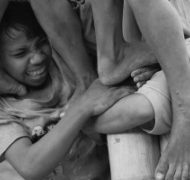Deconstructing Panjat Pinang
Blog / Produced by The High Calling
Each year on their country’s Independence Day, people in the villages of Indonesia take part in a tradition known as Panjat Pinang. Nut Trees, which tend to grow straight and tall, are cut down and erected in villages with prizes hanging from hoops at the top. The trunks are greased and young men and boys attempt to climb them to claim the goodies.
Of course, it’s very difficult to climb a greased pole alone. A common technique is to form a pyramid with people standing on each others shoulders until a small boy can climb to the top and toss down the prizes, which are then divided amongst those who participated.
The tradition dates back hundreds of years and is very popular among the people. But nothing is safe from our modern penchant for deconstruction, so it was perhaps inevitable that someone would discover and reveal the true origins of this ritual. As it turns out, the tradition had a very inauspicious beginning. Dutch colonists in the 1700s were fond of erecting greased poles in the villages, putting trinkets at the top, and laughing at the “natives” as they attempted to retrieve the beads and baubles.
It was terribly demeaning and cruel. We might think of it as the 18th century equivalent of Jerry Springer.
How interesting that a demeaning practice gave birth to such a beloved tradition. And how ironic that Panjat Pinang is now practiced as a celebration of Indonesian independence from colonial powers. Interesting and ironic, but not surprising. Many good things have humble or even embarrassing origins. I remember my own surprise in seminary, when I learned that the Southern Baptist Convention was formed in 1845 when Baptists in the South were angered by a denominational resolution that missionaries being sent to Africa could not be slave owners. "Southern" Baptists, it seems, wanted to buy slaves from Africa while simultaneously evangelizing the continent. So they broke away and formed their own denomination. Isn't that special?
I was a little embarrassed to find that the denomination I was a part of at the time had such a terrible beginning. But I didn't stop being a Southern Baptist.
As you might imagine, Panjat Pinang has now become controversial. Some want to ban the practice because of its colonial origins. But others want to keep the tradition. They acknowledge the unfortunate history but claim that the current practice has lost its original meaning. And anyway - they say - what kind of spoil-sports would ruin such a delightful thing as Panjat Pinang?
This seems to be a common theme among humans, who often innocently cherish rituals without knowing a lot about them. A courtroom has a statue of the Ten Commandments out front for so long that no one even remembers where it came from. Suddenly someone angrily points out that its presence may violate our constitutional prohibition of the government promoting any particular religion. Children dress up like Sponge Bob and go trick-or-treating on October 31st, only to have someone slip a religious tract into a child’s bag that makes a historical claim that everyone involved with Halloween is actually worshipping the devil.
I’m curious where you stand on these matters. Do you think the origins of rituals and traditions are the most important thing? Or do you think the reality of the present practice is what matters?
Gordon Atkinson
Photo by Pudjirahardjo





